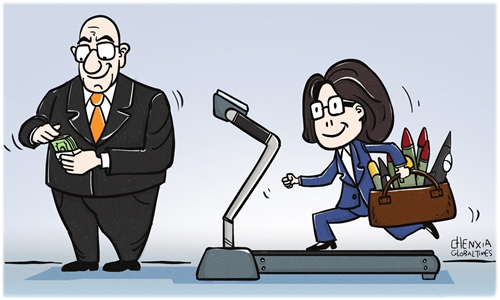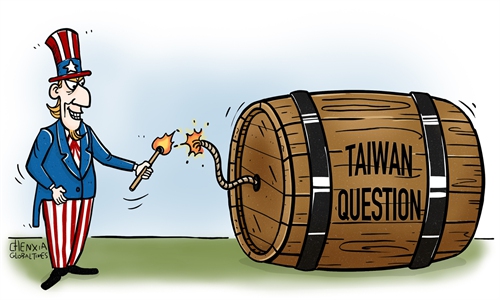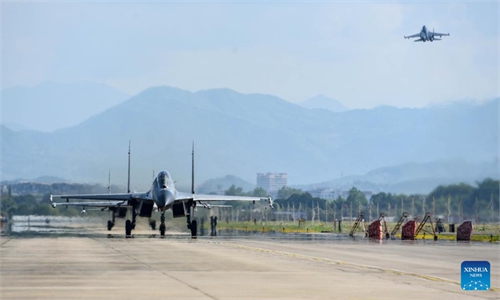China lodges stern demarche over US politicians’ latest Taiwan visit; ‘nation to steadily advance reunification process’ amid frequent provocations
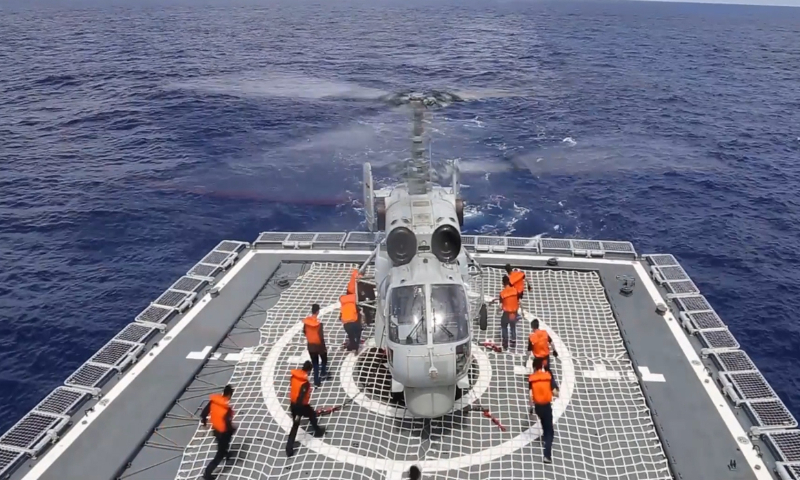
A Ka-28 anti-submarine helicopter of the Chinese People's Liberation Army (PLA) on the flight deck of the Type 052C guided missile destroyer Changchun on August 8, 2022. The PLA Eastern Theater Command continued realistic combat-oriented joint exercises in sea and air space around the island of Taiwan on Monday. Photo: Courtesy of PLA Eastern Theater Command's Sina Weibo account
Politicians and officials from the US, as well as some other Western countries, keep making or planning more visits to the island of Taiwan to further provoke China, as a delegation including Eric Holcomb, the governor of the US state of Indiana, arrived in Taiwan on Sunday for "trade talks," for which China has made serious demarches, as such provocation caused regional tensions to continue intensifying rather than easing, bringing increasing concerns among the international community.
Chinese analysts said on Monday that the visits to Taiwan, as well as US arms sales to the island, sent very wrong signals that encourage the secessionist Democratic Progressive Party (DPP) to go against reunification with force and seek foreign support, so the possibility of peaceful reunification is seriously shrinking, which makes the People's Liberation Army's (PLA) routine training and drills for a military solution around the island increasingly necessary.
A Chinese Foreign Ministry spokesperson, in response to Holcomb's visit, said in a statement that "Taiwan is an inalienable part of China's territory. The Taiwan question has always been the most important and the most sensitive issue at the heart of China-US relations. China firmly opposes official US exchanges with the Taiwan region in any form and under any name."
"We have made serious démarches to the US on Indiana Governor Holcomb's visit to Taiwan. We urge relevant party in the US to abide by the one-China principle and the three China-US joint communiqués and stop all forms of official interactions with the Taiwan region," said the spokesperson.
Continuous provocation
Holcomb's visit to the Taiwan region is the third publicly known trip by US officials since August, following US House Speaker Nancy Pelosi's highly provocative visit and a sneaky visit by five US lawmakers led by Senator Edward J. Markey.
According to Financial Times, 58 US Congress members have visited the island since Tsai Ing-wen, the DPP head and current regional leader of the island, took power in May 2016.
Experts said that after US House Speaker Nancy Pelosi's trip to the island earlier this month, Washington has felt the pain from the damage to China-US ties. China launched countermeasures against the US provocation, including canceling and suspending talks in multiple fields such as military, law enforcement and climate change, and also sanctioned Pelosi and her family members.
Pelosi, and even the White House, will continue to encourage more lawmakers or governors, and even senior officials of the Biden administration to pay visits to Taiwan so as to share the blame on Pelosi for bringing losses to the US due to worsening China-US ties, observers said, noting that some US officials very much want to make the visits as they can benefit from the dangerous tensions.
Holcomb's trip focuses on strengthening Indiana's technology microelectronics ecosystem, according to Indiana's press release, as it came after the signing of the US CHIPS Act, which is aimed at containing China's development in the chip industry, and the recent announcement that Taiwan-based semiconductor company MediaTek will open a design center in Indiana.
A Beijing-based expert on international relations who asked for anonymity told the Global Times on Monday that "as the US midterm elections are approaching, it's possible that more US politicians will use the island of Taiwan to show that they are tough on China, and to seek benefits from the dangerous tensions to serve their own political interests."
Although the US media and some US officials keep saying that "the White House can't order Congress," the facts show that the Biden administration will tolerate and defend the provocative moves made by US lawmakers even when they know this will seriously damage China-US ties, experts said.
"China and the international community won't be fooled by US hypocrisy, and it's nonsense for the US to blame China. The PLA's drills are not overreacting at all, but legitimate acts to respond to provocations. More importantly, the US is still sending the wrong signals by allowing more visits to the island, and China will naturally sense that the possibility of peaceful reunification is shrinking, because what it sees is that the US shows no respect for its sovereignty and warnings," said the anonymous expert.
Those US officials who criticize China's recent actions should understand that it was the US that totally disappointed China and that Washington is betraying China by breaking the promise of respecting the one-China principle, and it was the US that made China consider and prepare for a military solution to the Taiwan question, he said.
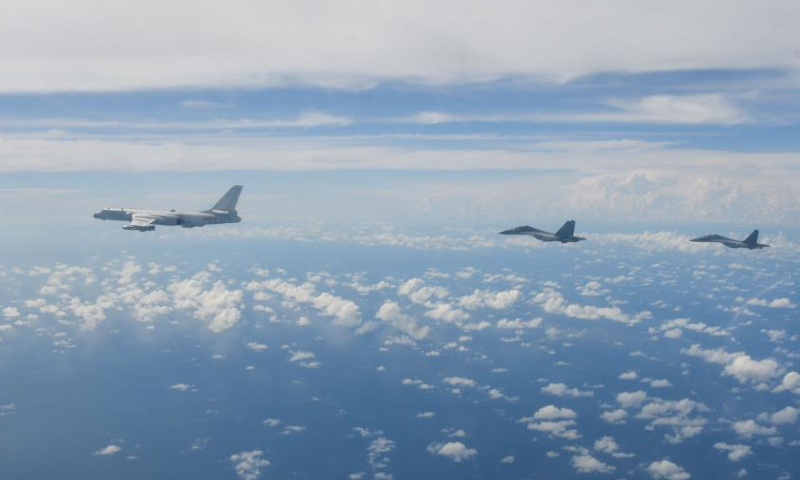
Warplanes of the Eastern Theater Command of the Chinese People's Liberation Army (PLA) conduct operations during joint combat training exercises around the Taiwan Island, Aug. 7, 2022. The Eastern Theater Command continued its joint combat training exercises as scheduled on Sunday in the waters and airspace around the Taiwan Island. Photo: Xinhua
Unstoppable reunification process
Due to the US moves, a number of politicians from some Western countries, including Japan, Canada and Lithuania, as well as some European countries, have also made or planned to make visits to the island, which serves the DPP's secessionist demand to "internationalize the Taiwan question," said analysts.
Chiu Yi, a Taiwan-based expert on cross-Straits relations and Taiwan politics, told the Global Times on Monday that "the DPP authorities will spend huge amounts of Taiwan taxpayers' money to receive the frequent visits and make the Taiwan question more internationalized. This brings no concrete benefits to the people on the island, but only serves the secessionist DPP, and will create huge space for corruption as well."
By inviting so many delegations from Western countries, the DPP can pretend to be "a victim bullied by the powerful Chinese mainland and gain international support and sympathy," and this narrative can actually fool many people in the island, but they should understand that it was the DPP that provoked the mainland first and ruined cross-Straits relations through a series of secessionist policies since it took power in 2016, Chiu noted.
Song Zhongping, a Chinese military expert and TV commentator, told the Global Times on Monday that "there is no need to pay too much attention to those politicians who want to get media exposure by copying Pelosi's trip to the island. The key for China in handling the problem is the US."
Only strength can convince the hegemonic US, and the PLA's routine military actions around the island are not just a response to the US politicians' visits, but serious preparations for actual combat, and for the necessary military operation in the future to solve the Taiwan question once and for all, Song said. "So there is no need for China to be in a rush, as it just needs to steadily push forward its plan for reunification, while the provocations made by the US and its followers are actually meaningless in interrupting China's reunification goal," he added.
Rising concerns
The frequent visits to the island have not shown a "diplomatic victory" for the US, but have raised concerns and criticisms from the international community and even within the US, while some have even accused the US of provoking China into a war that harms the whole region.
In a recent interview with The Wall Street Journal, former US secretary of state Henry Kissinger expressed worries over "disequilibrium", saying the US is heading aimlessly toward the brink of war against Russia and China on issues they partly created, and should be very careful in measures which seem to change the structure of US-China relations.
"The US should not by subterfuge or by a gradual process develop something of a 'two-China' solution," said Kissinger earlier in May at the World Economic Forum.
Countries in the Asia-Pacific region are especially feeling the pressure of living under the shadow of tensions across the Taiwan Straits. Singapore Prime Minister Lee Hsien Loong on Sunday said tensions between China and the US affect security in the Asia-Pacific, after warning of the risk of miscalculations over tensions in the Taiwan Straits two weeks ago.
Former Malaysian Prime Minister Mahathir Mohamad on Friday accused the US of trying to provoke a war in Taiwan through recent visits by US officials. "America is provoking (China) so that there can be a war," Mahathir said.
"Then there is an excuse… for the US to sell a lot of arms to Taiwan," he added.
Regional countries including the Philippines and Indonesia expressed the importance of China and the US avoiding any miscalculation and further escalating tensions, calling on them to refrain from provocative actions that may worsen the situation.
Russian President Vladimir Putin also slammed Pelosi's visit to the Taiwan region, saying it was "not just a trip by a single irresponsible politician, but part of a deliberate, conscious US strategy to destabilize and deteriorate the situation in the region and the world; a brazen display of disrespect for the sovereignty of other countries and for its international obligations. We see this as a carefully planned provocation," Russian news agency TASS reported.
Recently, the US has received very limited endorsements from allies for its groundless accusations against China over Taiwan Straits tensions caused by Pelosi's visit, proving that the one-China principle is a strong international consensus, and the international community has a clear understanding of who's provoking and who's being provoked, analysts said.

